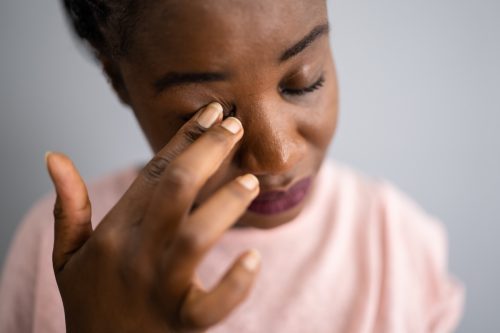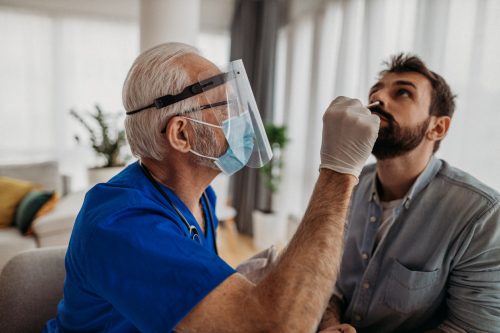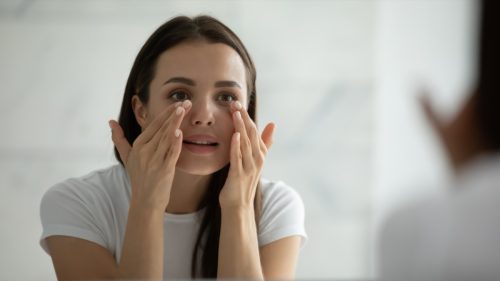The Omicron variant has spread so rapidly around the U.S. that it now accounts for 99.5 percent of new cases in the country, according to the Centers for Disease Control and Prevention (CDC). But the speed in which this new version of the virus is spreading isn’t the only way it differs from previous iterations. Virus experts and doctors have been warning that an Omicron-based COVID infection might manifest differently from past cases, in both severity and in terms of symptoms. And now, doctors are warning about one Omicron symptom that could arise on your face. Read on to find out what problem you should be looking out for as a potential sign of a COVID infection.
RELATED: If You Notice Pain Here, It May Be an Omicron Symptom, Doctors Warn.


Google searches for “eye pain” and “itchy eyes” have been on the rise since early December, when the now-dominant Omicron variant first began to spread across the U.S., NBC-affiliate KXAN reported. Several people have even tweeted about experiencing itchy eyes with their recent COVID infections.
“Started with a sore throat got rid of it quickly, tons of sneezing and itchy nose and eyes,” one Twitter user said about their Omicron case. Another person tweeted a similar experience. “Finally down with COVID this week. Likely Omicron. Almost out of the woods after three grim days of muscle aches, high fever, itchy eyes, nausea and hacking cough,” they tweeted.
Eye problems have not been frequently seen with prior variants of COVID, but issues like pink eye, light sensitivity, sore eyes, and itchy eyes have been anecdotally reported, according to the Mayo Clinic. “Many respiratory viruses can impact the conjunctiva of the eye,” Amesh A. Adalja, MD, a senior scholar at the Johns Hopkins Center for Health Security, explained to Prevention.


Emerging research has been showing that Omicron is more likely to affect the upper respiratory tract instead of the lungs, unlike some prior versions of the virus, according to the World Health Organization (WHO). “Omicron looks like much more of an upper respiratory tract infection,” Diego Hijano, MD, a pediatric infectious disease specialist at St. Jude Children’s Research Hospital in Memphis, Tennessee, confirmed to the U.S. News & World Report.
As a result, this variant is producing more symptoms in areas like the nose, throat, and eyes. Tatevik Movsisyan, OD, the chief of Advanced Ocular Care Service at The Ohio State University College of Optometry, told the news outlet that Omicron’s impact to the eyes could cause some of these uncomfortable feelings. “With any virus, the body’s response is inflammation, which can cause redness and itching of the eyes,” she said.
RELATED:
For more up-to-date information, sign up for our
daily newsletter.


However, itchy eyes on their own shouldn’t raise your alarm too much. Adalja told Prevention that if you just develop this eye issue and nothing else, it’s likely the result of something different. Itchy eyes caused by COVID is “unlikely to occur in isolation,” he said.
But if you start showing signs of other cold-like symptoms alongside itchy eyes, it’s worth taking a test to see if you’ve been infected by the Omicron variant, said Adalja. The CDC notes that the most commonly reported symptoms attributed to the Omicron variant are cough, fatigue, congestion, and runny nose.


If you are experiencing itchy eyes due to Omicron, you don’t have to remain in pain. Vatinee Bunya, MD, an ophthalmologist at Penn Medicine, told Prevention that she suggests using over-the-counter (OTC) artificial tears to soothe irritate eyes. OTC antihistamine eye drops might also help, according to Grayson Armstrong, MD, the director of ophthalmology emergency service at Mass Eye and Ear.
“They prevent itching—it’s like Benadryl for your eyes,” he told the magazine. But whatever you do, don’t rub your eyes. “It can make the itching worse and can spread the infection to other people if it’s in your tears,” Armstrong said.
Your eyes also should not remain itchy or irritated for long. “It should subside after the virus has passed,” Movsisyan explained to Prevention. If you’ve recovered from COVID and are still dealing with itchy eyes, it might be the result of another underlying issue and Movsisyan recommends you see an eye doctor to figure out what that could be.
RELATED: This One Symptom Could Be Your First Sign of Omicron, Doctors Warn.